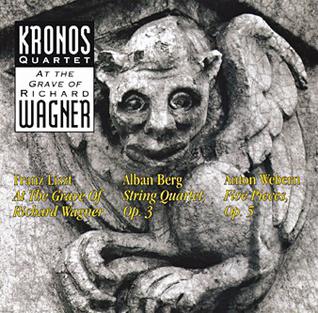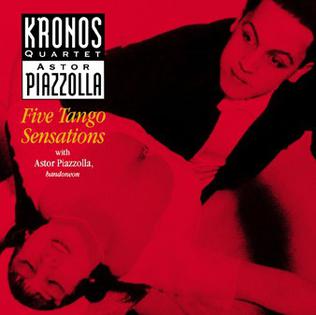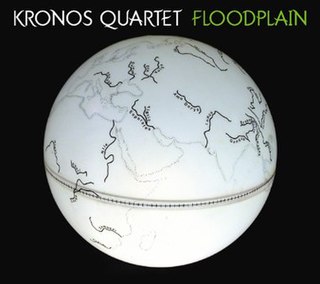
The Kronos Quartet is an American string quartet based in San Francisco. It has been in existence with a rotating membership of musicians for almost 50 years. The quartet covers a very broad range of musical genres, including contemporary classical music. More than 900 works have been written for it.

Djivan Gasparyan was an Armenian musician and composer. He played the duduk, a double reed woodwind instrument related to the orchestral oboe. Gasparyan is known as the "Master of the duduk". In 2006 he was nominated for Grammy awards for the Best Traditional World Music Album.
Osvaldo Noé Golijov is an Argentine composer of classical music and music professor, known for his vocal and orchestral work.
John Harris Harbison is an American composer, known for his symphonies, operas, and large choral works.

Hazmat Modine is a musical group based in New York City and led by singer/songwriter and multi-instrumentalist Wade Schuman. Their music is rooted in blues and also touches on folk, jazz and World music. The most recent lineup of the band circa 2015 features harmonica, tuba, trumpet, saxophone, drums and two guitars, as well as solo and harmony vocals.

Black Angels is a 1990 album by the string quartet Kronos Quartet. It includes, and was named after, George Crumb's 1970 composition Black Angels, the composition which had inspired David Harrington to found the Kronos Quartet in 1973.

Terry Riley: Requiem for Adam is a studio album by the Kronos Quartet. The music was composed by Terry Riley, commissioned by the quartet; the album is a requiem for Adam Harrington, the son of Kronos co-founder David Harrington.

Kronos Quartet Performs Alfred Schnittke: The Complete String Quartets is a studio album by the Kronos Quartet. The double CD contains all four of Russian composer Alfred Schnittke's "startling" string quartets. String Quartet No.3 was recorded and released in 1988; the other three were recorded between 1994 and 1996 and released in 1998.

At the Grave of Richard Wagner is a studio album by the Kronos Quartet, containing works by Alban Berg and Anton Webern, and a brief "romantic elegy" by Franz Liszt.

Kevin Volans: Hunting:Gathering is a studio album by the Kronos Quartet, containing works by South African composer Kevin Volans composed especially for the quartet.

Five Tango Sensations is a suite of works (Asleep—Loving—Anxiety—Despertar—Fear) for bandoneón and string quartet written in 1989 by Argentine composer Ástor Piazzolla. It was premiered in New York that year and recorded immediately afterwards by the Kronos Quartet and the composer, who played the bandoneón. The record was one of a set of three internationally tinged albums released simultaneously, the Argentine music of this album being accompanied by the music of South-African composer Kevin Volans on Kevin Volans: Hunting:Gathering and the music of Polish composer Witold Lutosławski on Witold Lutosławski: String Quartet.
Pieces of Africa is a 1992 studio album by the Kronos Quartet, containing works commissioned by the quartet, written by seven African composers.

Floodplain is a studio album by the Kronos Quartet released in 2009. All twelve compositions were written or arranged for the quartet.

Witold Lutosławski: String Quartet is a studio album by the Kronos Quartet, containing String quartet by Polish Witold Lutosławski composed in 1964 and first performed in 1965. This string quartet is an example of aleatory music, that is, music in which some element of the composition is left to chance, and/or some primary element of a composed work's realization is left to the determination of its performer(s). As Gerald Gold noted in a review of the Kronos album in The New York Times, "the Lutoslawski composition integrates notated music with chance performance."

Henryk Górecki: String Quartets Nos. 1 and 2 is a studio album by the Kronos Quartet, with two compositions by Polish composer Henryk Górecki. The Kronos Quartet had recorded "Already It Is Dusk", his first string quartet, in 1990 and released it on Henryk Mikolaj Górecki: Already It Is Dusk/"Lerchenmusik". The Kronos Quartet recorded and released all three of Górecki's string quartets, the third and last in 2007, on Henryk Górecki: String Quartet No. 3 .

Bob Ostertag: All the Rage is an experimental album by the Kronos Quartet and Eric Gupton (reading). It is a composition by Bob Ostertag, whose loops and samples are alternated with music by the quartet. Ostertag composed the piece as a response to California governor Pete Wilson veto of pro-gay legislation in 1991. Proceeds went to AIDS research.

Early Music is a studio album by the Kronos Quartet, containing 21 compositions, many of which were written, arranged, or transcribed for the quartet. The subtitle is from Dowland's Lachrimae, or Seaven Teares of 1604.
Mikhail Davidovich Alexandrovich, a.k.a. Misha Alexandrovich was a Latvian Jewish tenor, and cantor, internationally acclaimed as a fine performer of classical and popular repertoire in several languages.

You've Stolen My Heart is a 2005 studio album from the Kronos Quartet, featuring arrangements of the music of Indian composer Rahul Dev Burman, with vocals by Asha Bhosle, she sang the original versions of the album's songs and was married to Burman until his death in 1994. The album features keyboards, autoharp, and various percussion instruments in addition to the Kronos Quartet's core string quartet instruments. The recordings also feature Indian percussionist Zakir Hussain and Chinese pipa virtuoso Wu Man.
Judith Dorothy Sherman is an American audio engineer, and record producer. She has been nominated for 18 Grammy Awards and won 14 including for Producer Of The Year, Classical seven times. She has worked with contemporary composers on recordings including Steve Reich, Elliot Carter, John Adams, John Corigliano, and Philip Glass. Notable artists she has worked with include the Alexander String Quartet, Kronos Quartet (Nuevo), Pacifica Quartet, Cincinnati Pops Orchestra, London Symphony Orchestra, and the Cleveland Quartet.















